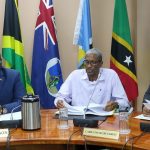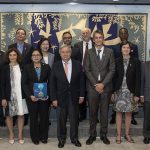US/CARICOM Relations: WTO CBI waiver secured, but …

By Elizabeth Morgan
The US request for the Most Favoured Nation (MFN) waiver for the Caribbean Basin Initiative (CBI) was approved at the General Council Meeting of the World Trade Organization (WTO) held October 15-16. The CBI comprises the Caribbean Basin Economic Recovery Act (CBERA) and the Caribbean Basin Trade Partnership Act (CBPTA).The waiver, which gives legitimacy to the CBERA/CBPTA in the WTO, is for 6 years to end on 30th September 2025.
Members of the Caribbean Community (CARICOM), now the principal beneficiaries, welcomed the waiver approval and thanked the US administration for securing it.
The CBPTA, however, expires on 30th September 2020. In February, a bipartisan Bill to extend CBERA/CBTPA was again tabled in the US House of Representatives by Representative Teri Sewell (D-Al). At the time, I suggested that it would have been better to obtain the extension and, thereafter, request the waiver. At the US/CARICOM Trade and Investment Council Meeting in June, officials of the Office of the US Trade Representative (USTR) signaled their intention to request the waiver.
There is still no further movement on this Bill in the House. Senator Johnny Isakson (R-GA) tabled a similar Bill in the Senate on September 12. As the CBPTA expires in September 2020, I believe that there isn’t the urge to expedite adoption of this Bill. After all, the Congress is seized with far more important and pressing matters.
I understand that the CARICOM Caucus of Ambassadors in Washington DC, with support from Caribbean interest groups, is continuing to lobby for the Bill’s adoption. The impact of Hurricane Dorian in the Bahamas and the situation in Haiti may strengthen the cause.
In looking at this issue, I like to consider the bigger picture including the US position in the WTO on the development status of developing members proposing differentiation and graduation from special and differential treatment (S&DT) flexibilities. I also look at overall US/CARICOM relations, which, I gather, are actually not as tepid as appears. There has been some movement in the implementation of the 2016 US/Caribbean Strategic Engagement Act and its related 2017 Strategy under priority areas such as energy and disaster relief. It remained unclear whether significant progress has been made under the priority area, ‘prosperity’, dealing with trade and investment and business and infrastructure development. However, following from the meeting of a group of CARICOM Heads with President Trump in March, a May 23 press release from the US Overseas Private Investment Corporation (OPIC) informed that a high level team visited the Bahamas, Jamaica, Haiti, St. Lucia and the Dominican Republic to explore investment opportunities in energy and other critical sectors and to strengthen relationships with key partners in fostering security and stability in the Western Hemisphere. I also noted that a US Small Enterprise Assistance Fund is partnering with Sagicor Investment to assist small and medium-sized enterprises in the Caribbean.
Implementation of the 2017 Strategy is coordinated through the Department of State and US Agency for International Development (USAID). From what I am reading and seeing on television, it is not surprising that overall implementation is moving at a slower than normal pace.
The Caribbean is supposed to be the US’ third border. The US is the region’s principal trading partner. In a recent press report, there was concern about Jamaica’s zero population rate if low birth and high migration levels continue on the same trajectory. I welcome the waiver in the WTO. But, as we endeavor to implement the UN Sustainable Development Goals, how wonderful it would be were the US to really partner with us to achieve these goals, by adopting the extension Bill and fully implementing the 2017 Strategy, creating a more secure and prosperous environment in our countries, allowing those at home and abroad to genuinely proclaim – a yah suh me live, a yah suh me luv, a yah suh suit me well nice!.
Submitted by Elizabeth Morgan, Specialist in International Trade Policy and International Politics
Source: CARICOM TODAY

 Previous Post
Previous Post Next Post
Next Post